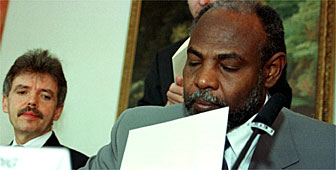Swiss-backed ceasefire keeps peace in Sudan

The United States special envoy to Sudan, Jonathan Danforth, visited Switzerland two days before a six-month extension of a Swiss-brokered ceasefire comes into force.
The discussions between Danforth and Joseph Bucher, the former Swiss ambassador to Kenya and now Bern-based special envoy for conflict issues, focused on the hopes that an ongoing peace process in Sudan would continue.
This is something Danforth said remained the primary concern of the US policy towards the Sudan.
“The US is looking for cooperation from all countries and particularly from the government of Sudan. Our interest in peace and humanitarian relief are all very real issues and real interests,” he told swissinfo.
Original ceasefire
The original ceasefire, settled in January with the help of Swiss, United States and Norwegian negotiators, ends on Friday, but the warring parties have already agreed to extend it.
The deal is the most hopeful sign that a lasting political solution can be reached between the Sudan People’s Liberation Army (SPLA) from the country’s Christian south and Sudan’s Muslim-backed government.
It has already helped to ease tensions in the African nation, which has been wracked by an internal power struggle for the past 20 years. The war is estimated to have claimed over two million lives.
Wide support for ceasefire
Joseph Bucher told swissinfo that the original ceasefire agreement – signed on January 19 near Lucerne – had been a success.
“The extension of the ceasefire agreement [last week] did not need a lot of mediation because the conclusion of the [original] ceasefire agreement was received on both sides much better than expected,” Bucher told swissinfo.
“[And] that has to do with the popular support the agreement received at the very beginning.”
After decades of war, the ceasefire has provided the first real opportunity for the divided country to build a stable future.
Chance to rebuild
A key feature of the agreement involved the formation of a “joint military commission”, run by both sides of the conflict and supported by Switzerland, the US and Norway.
Bucher said the commission had successfully helped to diffuse military tensions, and was now focusing its efforts on basic institutional reform.
“On the military side, 99 per cent has been concluded. What is left is the area of civil administration and particularly the setting up of a police force,” he said.
“That is the priority for the next six months.”
Bucher said international observers hoped the ceasefire would gradually grow into a lasting solution.
“The longer term view is that in a year or two, the whole problem of southern Sudan should find a political solution and then this limited ceasefire in the Nuba Mountains would be integrated into a more comprehensive solution for the Sudan.”
Liaison and financial support
Switzerland’s contribution to Sudan is non-military and involves financial support along with at least four key personnel.
Bucher said although Switzerland was invited by both parties to assume chairmanship of the joint military commission, it was unable to accept because the newly-formed body was not covered by a United Nations security council resolution.
“So we had to look for non-military activities. One [observer] is doing the accounting for the whole operation, and that covers about $15 million [SFr21.8million] per year,” he said.
“The second one is running the logistics operation, [which] has about 30 expatriates active in that, along with around 150 local staff with helicopters and cars.”
“The third one is the officer for press and information, and the fourth one – perhaps the most important – is the liaison between the joint military commission and the SPLA Nuba residing in the SPLA controlled areas.”
by Jacob Greber and Sally Mules

In compliance with the JTI standards
More: SWI swissinfo.ch certified by the Journalism Trust Initiative








You can find an overview of ongoing debates with our journalists here . Please join us!
If you want to start a conversation about a topic raised in this article or want to report factual errors, email us at english@swissinfo.ch.